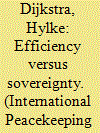| Srl | Item |
| 1 |
ID:
116354


|
|
|
|
|
| Publication |
2012.
|
| Summary/Abstract |
This article analyses why the UN's members delegate resources to the UN Secretariat in the sensitive field of peacekeeping. It argues that the Secretariat can carry out planning and implementation functions more efficiently, but that the states remain wary of potential sovereignty loss. Through a mixed methods approach, this article provides evidence for such a functional logic of delegation, but shows that it only applies from the late-1990s on. The change in approach of states towards delegation can be explained by feedback from the dramatic failures of peacekeeping in Bosnia and Herzegovina, Rwanda and Somalia.
|
|
|
|
|
|
|
|
|
|
|
|
|
|
|
|
| 2 |
ID:
193829


|
|
|
|
|
| Summary/Abstract |
Although UN peace operations began with unarmed observer missions in 1948–1949, the first armed force—the UN Emergency Force (UNEF)—was deployed in 1956 due to the Suez crisis. Scholars and practitioners have since interpreted the UN Secretariat’s 1958 study of that experience, called the Summary Study, as a foundational text in the history of UN peacekeeping because it supposedly codified the key principles of impartiality, nonuse of force, and consent. But much of the Summary Study’s origin story is inaccurate or unknown. By explaining Secretary-General Dag Hammarskjöld’s intentions for the study, as well as how those intentions changed, this article argues that far from “codifying” foundational principles, the Summary Study did the opposite: it ensured that future peacekeeping operations would continue on an ad hoc, flexible basis that permitted the Secretary-General and Member States to exercise a wide range of discretion in determining how to conduct future operations.
|
|
|
|
|
|
|
|
|
|
|
|
|
|
|
|